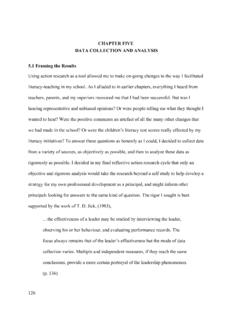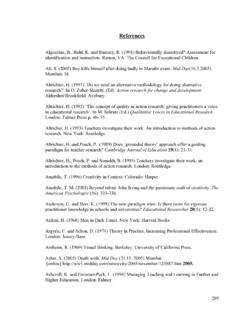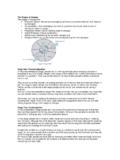Transcription of Chapter Five Methodological Approach - Action Research
1 80 Chapter five Methodological Approach Introduction In this Chapter , I will set out the Action Research methodology that I intend to use in my self-study as well as exploring other forms of Research . I will discuss the concepts of ontology and epistemology and their relevance to our understanding of Research . I use a 'living educational theory' Approach to Action Research as it allows me to provide explanations for my own learning, my influence in the learning of others and my influence in the education of social formations. Normative and interpretive are terms used to describe two perspectives on the nature of the world or reality. Whichever view we take will affect how we go about uncovering knowledge and social behaviour. These two perspectives relate to one s assumptions in four areas: ontological, epistemological, socio-cultural and Methodological .
2 In any discussion about Research , it is important to explain one s assumptions. I will explore these four sets of assumptions. Ontology refers to whether reality is objective and external to human beings or whether it is created by one s own consciousness. Epistemology is concerned with knowledge and how it can be acquired. The question here relates to whether we see knowledge as a hard body of objective reality or as a subjective experience of reality. Whichever view we take will affect how we go about uncovering knowledge. The socio-cultural assumption concerns the relationship between humans and the natural environment. This refers to whether or not the human being is essentially active or passive. Do we respond to external events or stimuli or are we active initiators of our own actions? Whichever 81 perspective we adopt will affect the Methodological Approach that we choose in Research .
3 Usher believes that most researchers hold these commitments tacitly. What we can conclude from this is that methods are embedded in commitments to a particular version of the world (an ontology) and ways of knowing that world (an epistemology) (Usher, 1996, p. 13). Thus epistemological and ontological questions are related since claims about what exists in the world imply claims about how what exists may be known. Positivist tend to view that universal laws govern social behaviour and to treat knowledge as objective. If we adopt a positivist stance in pursuing educational Research we will tend to see the social world as analogous to the natural world and susceptible to the formation of universal laws. Competing views are more skeptical of generalisations and more alive to the play of human creativity whose consequences may be difficult to predict.
4 For many years epistemology took the position that any claim to know must be justified on the basis of how the claim was arrived at. In many Research fields, the good grounds for judging the validity of knowledge claims was that the researcher was objective , the researcher took an observer role, using the methods of natural science or scientific methods. The researcher did not enter the equation. Research conducted along these lines entails an epistemology heavily laden with positivist and empiricist notions. Scientific method, so constructed, could be seen as the way to guarantee "true and certain knowledge" (Usher, 1996, p. 26). If we take the position that the knower exists apart from the knowledge, which is, "a free-standing unit with an existence of its own" (McNiff & Whitehead, 2002, pp. 17-18). In this view, we are led to adopt a particular form of epistemology and the assumptions that go with it.
5 82 Usher points out that positivist/empiricist epistemology is based upon a set of beliefs. These include the expectation that there is a certain truth that can be known, that there must be no contradictory explanations, that there must be convergence on a single explanation; that Research leads to generalisations which in turn enable predictions to be made and events to be controlled. Usher is convinced that a positivist Approach can be seen as unreflexive, since its main focus is on methods and outcomes, and there is no question or discussion about the Research process itself. Usher (1996, p. 14) warns of the danger of taking a natural science view of social or educational science. He sees that the ontological assumptions underpinning this view are of the world as "orderly, lawful and hence predictable, are highly problematic".
6 Interpretive Research One may set against the positivist approaches to Research discussed above, another Research tradition, that of interpretive Research which traverses fields such as phenomenology, ethnography, and hermeneutics. The assumption underpinning the epistemology proper to this school of Research is that all human Action is meaningful and has to be interpreted and understood within the context of social practices (Usher, 1996, p. 18). In order to make sense of the social world, the researcher needs to understand the meanings that form and are formed by interactive social behaviour. Human Action is given meaning by interpretive frameworks. Within an interpretive framework, the researcher tries to make sense of what s/he is researching. This process is known as 'double hermeneutic' in that in the conduct of social Research , both the subject (the 83 researcher) and the object (other people in the study) of the Research bear the same characteristic of being interpreters or sense seeking.
7 Critical theory school Advocates of the Critical theory school believe that positivist and hermeneutic schools did not address the historical, cultural and social situatedness of researchers. The aim of Critical theory is to make people aware of their historical, cultural and social conditioning and discover how to recreate their personal and social realities (McNiff & Whitelead, 2002, p. 33). Habermas is the main proponent of the critical theory Approach . He points to the importance of the following four validity claims that are implicit in any communicative transaction and that the speaker must be able to defend. The speaker claims to be: Uttering something understandably; Giving [the hearer] something to understand; Making himself thereby understandable; and Coming to an understanding with another person. (Habermas, 1976, p.)
8 2). Habermas claims pertain to the 'ideal speech situations . For Habermas, (1976) truth is the outcome of rational agreement reached through critical discussion. 84 McNiff & Whitehead (2002, p. 34) points to the power of critical theory for social renewal. However, warn that while critical theorists point to what is required to redress wrongs, they do not show how their theories can be realised in practice. Gergen and Gergen (1991, p. 78) believes that, knowledge is part of the coordinated activities of individuals, which are used to accomplish locally-agreed-upon purposes concerning the real and the good . The focus is on inter-dependence and not independence. Steier (1991, p. 180) points out that when the observer is situated within his or her Research enquiry, we have the makings of a reflexive methodology for Research . He refers to the term ecology in the Bateson sense of a context that includes the idea of a researcher (co-)constructing (with reciprocators) a world (ibid).
9 Thus there is now an active and lively body of researchers who are convinced that Research enquiry in the human sciences can and should take account of the potentiality for creative Action of all relevant participants, including the researcher, and relate to broader social environments. My Research perspective I believe that ontology and epistemology are inextricably linked in self-study Research . Research can be seen not as abstract but as involving interactions with others. As a higher education educator, I believe that my learners and I co-construct knowledge together, and this is a knowledge creation process. In exploring the different views of reality, I take the view that reality is constructed in collaboration with my students and that I construct meanings in relation to others. This has implications for the methodology of my Research as I do not see knowledge as a fixed quantum but as an ongoing activity.
10 In other words, social reality is constructed through interaction with others and so the observer s exchanges with the observed, 85 and the wider outcomes of these exchanges through these connections, represent a vital element in this form of Research . In exploring how I am improving my practice I take an educational Action Research Approach . I relate to Bertrand s claim that knowledge comes first out of uncertainty or a question: Knowledge is the opposite of the demonstration of a rule and it has nothing to do with the bureaucratisation of ideas. It is an awareness, a sensitivity to life, to things that cannot be known, to uncertainty" (Bertrand, 1998, p. 117). He believes that we have to rely on our imagination, or we risk believing that textbook, and the media, such as TV and movies show us real life. My view of educational Research is that it is about improving education and at the same time contributing to knowledge.











